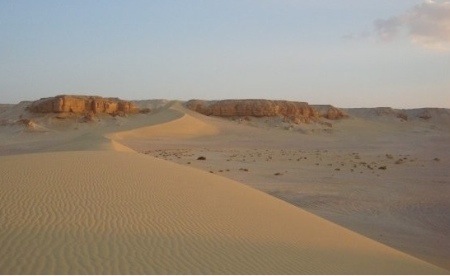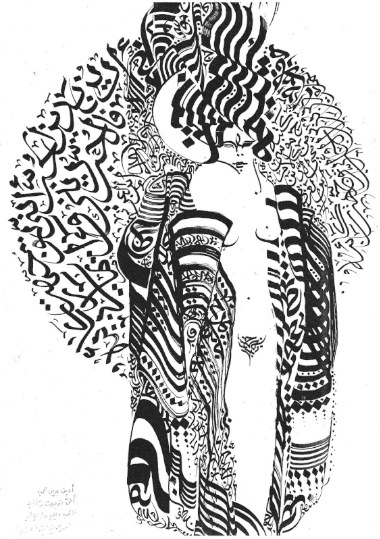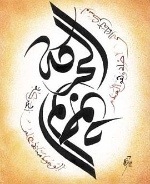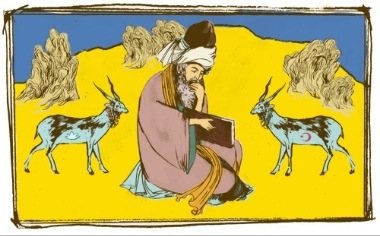You are currently browsing the monthly archive for December 2009.
Symptom:
If yesterday I would have spent a sleepless night thinking of you, tomorrow your existence might not even interest me.
 “Only unfulfilled love can be romantic.”
“Only unfulfilled love can be romantic.”
–Maria Elena in Vicky, Cristina, Barcelona.
الشوقُ يسكن باللقاء ، والاشتياقُ يهيج بالالتقاء .. ما عرف الاشتياق إلا العشَّاق .. للنار التهابٌ وَمَلَكَه ، فلابد من الحركة ، والحركة قلق ، فمن سكن ، ما عشق .. كيف يصحُّ السكون ، وهل فى العشق كُمون؟ هو كلُّه ظهور ، ومقامُه نشور
Longing comes to rest with meeting,
But yearning only gets stronger with it.
Only lovers know yearning.
When its fire blazes and holds sway,
Then motion is a must,
And motion unsettles,
So he who settles or rests is not in Love.
How can rest be possible?
Is Love ever still?
It’s all emergence and its province a resurrection.
In a related line of thought, Ibn Arabi also said that “The principle of the universe is movement. If it stops moving, it will return to non-existence.” You can read this below which I found here.
He. His essence speaks through me.
I have been looking for myself!
Jalal al-Din Rumi: one of the greatest Sufi poets/teachers who wrote in Persian. I have looked and looked in Cairo’s bookstores but I can’t find any recent prints of his works (translated into Arabic). Not even light collections of poetry. Not one.
I even asked a bookstore clerk at Al-Shorouk “how come, don’t people ask for them?” and he told me no one really asks. It seems English translation is the way to go.
This deficiency goes on while constantly decent new translations are showing up in the English speaking world (for example, this in 2007). And studies/review articles in newspapers too.
Franklin Lewis is currently publsihing a series for The Guardian on Masnavi -Rumi’s greatest work, and perhaps the greatest of all Persian literature, some even call it the Persian Quran. He is on part three now of this Masnavi exposition and there will be five more to come.
 “Strive to give back the Divine in yourselves to the Divine in the All.” -Plotinus
“Strive to give back the Divine in yourselves to the Divine in the All.” -Plotinus
In this desert trip I came back from, some thoughts came flying over me. They were vivid and clear back then but now that I write them down and that will you read them they are only a faint echo of what once was.
Perhaps I should not have imprisoned them as words here in this space. Perhaps they were better off roaming in the unbounded sky over the desert they came from. But I am a human being and this is what I do: turn thoughts into words.
Here they are anyway, and perhaps some of you who read them will one day take these thoughts back with you to a desert and try to remember them there and utterly fail to do so and in this failing the thoughts will be set free.
>>
It’s almost inconceivable how many different settings/scenes one can find oneself in on this little planet of ours. So many standpoints and so many angles. What’s more inconceivable is how different these many landscape are from one another, how much variety is in the world. Add to this the time dimension and this difference reaches new heights. My imagination breaks down at this point.
The one thing harder to imagine than time not existing is time actually existing in all its fullness. Time is the thread that weaves old realities into new ones ever so consistently. The creator and destroyer whose plans are never hidden, only hard to see.
Regardless of this or perhaps because of it, it seems that we are driven to look for the unchanging, the recurring, that which defies time because the timeless in a way defines what time it is (change) and what time is (as a concept, or a property of the universe).
We look for the unchanging around us like the Sun and all Heavenly bodies. Like gods. Like statues and drawings, the glimpses at gods. Like ideas and permanent connections, the souls of gods. Like words and music, the bodies of gods.
And the true timeless is the simplest. And the simplest has no divisions. It is a unit, a One, and because it is so basic it is the One. This Oneness must be the only property/attribute of what’s fundamental. Otherwise, divisions set in and simplicity is ruined.
Is this One in me? Is this One what’s missing from me? Does it complete whatever is incomplete?
Does its simplicity imply that is also good/loving and beautiful? I think so.
<<
I have come across this sentiment in many forms many times before in philosophical works: Leibniz, Spinoza, some Sufis, and Plotinus. I have read the latter a long time ago but was pushed away by his mysticism and that him right after philosophy took a turn away from this line of thought, Christian philosophy of St. Augustine that is, but then it turned back to it in the strange philosophy of Spinoza and then in Leibniz’ even stranger concept of Monads.
It seems there was nothing neither wrong nor right in this philosophy but now that I am reading Sufi poetry and am well into its theological visions, it seems Neoplatonism and Gnosticism must have had an influence on the Sufis. There is the same idea in both schools of philosophy which draws me into them.
But this idea of the One which I had is closest to what Plotinus thought. Wikipedia describes Plotinus’ One:
Plotinus taught that there is a supreme, totally transcendent “One”, containing no division, multiplicity or distinction; likewise it is beyond all categories of being and non-being. The concept of “being” is derived by us from the objects of human experience called the dyad, and is an attribute of such objects, but the infinite, transcendent One is beyond all such objects, and therefore is beyond the concepts that we derive from them. The One “cannot be any existing thing” but “is prior to all existents”. Thus, no attributes can be assigned to the One. We can only identify it with the Good and the principle of Beauty.
I came to the conclusion/vision that “yes, Oneness implies Beauty and Goodness” before reading Plotinus again. It was just a feeling though. Not sure why anyone would be inclined or compelled to believe it. I have no analysis to back it up.
I wonder if any form of analysis can be useful when dealing with something with only one attribute, the One having only Oneness. If analysis doesn’t work, then I can only demand a method which works without annihilation or architecture, something which I am still looking for.
Now I will go dive into Plotinus’ Enneads.

To someone who I once cared for, a new favorite poem by a new favorite poet:
أيا من سلوا عنا ومالوا إلى الغدر وما لزموا أخلاق أهل الهوى العذري
وبعد حلاوات التواصل والهوى جنوا مر طعم الهجر من علقم الصبر
إذا ما رجعتم عن محبتكم لنا مشاة رجعنا عن محبتكم نجري
وإن كنتم في الجهر عنا صددتم ففي سرنا عنكم نصد وفي الجهر
سكنتم فؤادي مرة ورحلتم فأصبح منكم خالياً خالي السر
وقال لي العذال هل أنت راجع إذا رجعوا عن غدرهم قلت لا أدري
شهاب الدين ابن الخيمي-
A name/word is a loud cry for infinity, for immortality, for the soul.
Here are pieces from Gamal Al-Ghitany’s Rinn which is all about names/words. I also wrote a review earlier if you want to know more about this travel journal/philosophical journey.
لم يبقى مني إلا الأسم، ليس مني فقط، إنما من سائر الموجودات، جميع الطرق و المسالك، الجهات، ما ينبت و ما يولد، ما ينتهي و ما يرحل، ما يطل و ما ينزع، و بقدر قوة الإسم يكون التحقق و حل المشكل، و كذا تصور الممكن
or: “Only the name is what remains of me, not just of me but of all beings; all roads, paths and directions; all what is planted and what is born; all what ends and what departs; all what lingers and what is plucked out. All this is nothing but names, and the stronger the name, the stronger the certainty, the solutions and the imagining of possibilities.”
About Isis, he writes: “In her dissociation is my annihilation, and in her union is the completion of the name, which is my pursuit.”
How does the name giver know and understand that the name is complete? When is Isis united or whole? Isis says in one of her songs that
يوم أُفنى كُلَّ ما خلقت
يعودُ الوجود محيطاً بلا نهاية
وأعودُ كما كنتُ دوماً
أفعى
عصية على الأفهام
“The day I destroy all I have created,
Being will return an infinite ocean,
and I will return, as I always were,
a serpent
beyond the grasp of understanding.”
This means that realizing this process of completion must occur outside the realm of the mind! The pursuit doesn’t end there. A new road opens.
And the holy passage to this new road happens after all her creation is destroyed and when infinity reigns all understanding/Being.
She says “the day I destroy,” but it’s really the observer/seeker who destroys their own creations. This can only mean one thing: at the point of destruction the person and Isis are one.
Also the serpent she returns to afterwards is nothing new to her, but is new to the person because then and only then the serpent becomes beyond the person’s understanding. Some of what seemed understandable before, now ceases to be so.
The naming of names is the soul uncovering itself and Isis completing herself.







